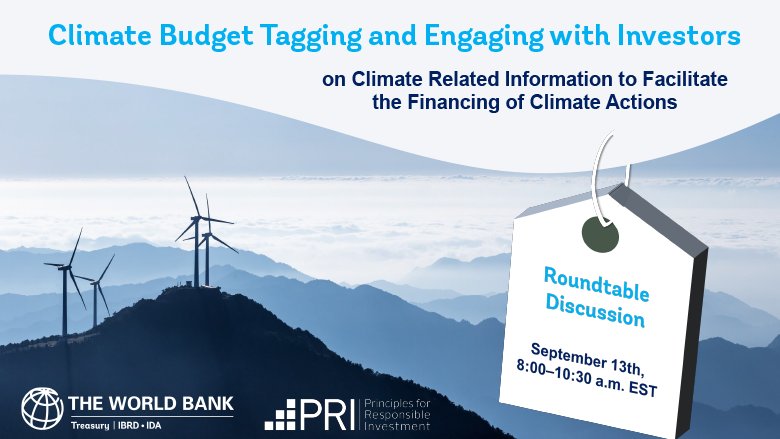On September 13, 2022, the World Bank Treasury Sustainable Finance Advisory organized a roundtable discussion to share investors' interest in climate-related information and showcase the value of climate budget tagging.

Photo credit Adobe Stock
Climate Budget Tagging is an important tool for governments to monitor and track what they spend on climate-related activities and communicate them to investors.
On September 13 World Bank Treasury organized a roundtable discussion on best practices for tagging climate-related expenditures in the national budget system—an emerging practice more and more ministries of finance are engaging in.
The benefits of Climate Budget Tagging are multiple. The mechanism promotes transparency and accountability, enabling the prioritization of investments towards national objectives and international commitments. It also raises awareness of and showcases efforts to tackle climate challenges, fosters better cooperation between government ministries, and mobilizes domestic and international finance by enabling the tracking of the allocation of resources.
More than 70 debt management and budget department officials from 32 countries participated in the roundtable with 12 investors convened by UN Principles for Responsible Investment, who said that climate budget tagging could contribute toward a holistic understanding of a country’s sustainability journey.
On September 13, 2022, the World Bank Treasury organized a virtual roundtable on financing climate actions and engaging with investors on climate-related information. The event brought together debt management and budget department officials from 32 countries, 12 select investor signatories of the Principles for Responsible Investment (PRI) supported by the United Nations, as well as experts from different areas of the World Bank.
The objective was to facilitate better engagement between sovereign issuers and investors through the exchange of perspectives, knowledge, and experiences on initiatives such as climate budget tagging that address investor needs for transparency around use of bond proceeds and helps them make better investment decisions. This is in line with the guidance provided by the World Bank to sovereign issuers to enhance their capacity to engage with investors on sustainability initiatives and performance to mobilize private capital.
Climate budget tagging is an emerging practice aimed at identifying, measuring, and monitoring climate-relevant expenditure. According to a review of international experience by the World Bank, at least 18 countries and one regional government have implemented budget tagging. Methodologies adopted, definitions of climate-relevant expenditures, coverage of sectors, measurement modalities, and integration in the budget cycle vary. Ministry of Finance Indonesia implemented climate budget tagging in 2016 and integrated the system in the national planning and budgeting cycle. Line ministries tag climate-related outputs during the work plan formulation. The allocated climate budget is then monitored and results are published annually in a climate expenditure report. Other countries follow a different process.
Sovereign debt investors welcome the practice as it allows them to better assess how a country is funding its climate-related commitments across the whole budget. But the lack of standardization across countries makes it difficult to compare and analyze the results. Nonetheless, some commonalities and more comparable practices are emerging as a growing number of countries adopt climate budget tagging.
Despite the interest, ministries of finance find the tagging methodology, governance process, and coordination across multiple ministries, agencies, and institutions challenging. However, such challenges are compensated by the multiple benefits of the mechanism— promoting transparency and accountability, enabling the prioritization of investments towards national objectives and international commitments, raising awareness of and showcasing efforts to tackle climate challenges, fostering better cooperation between government ministries, and mobilizing domestic and international finance by enabling the tracking of the allocation of resources.
Climate budget tagging also makes it easier to issue green, social, sustainability bonds whose proceeds finance climate actions and other environmental priorities, as Indonesia has done very successfully. Thematic bond issuers reported that governance and transparency arrangements established to issue such bonds introduce much needed discipline and regularity as they require cooperation between different government ministries, alignment with international standards, and robust engagement with investors. Although climate budget tagging and thematic bond issuances have developed independently, they can provide complementary results for governments and investors. Tagging is useful for the identification of eligible expenditures, tracking, monitoring and reporting on the use of proceeds and impacts, as required by green bonds. Climate budget tagging may also help investors assess sustainability at the issuer level, regardless of whether thematic bonds are part of a sovereign’s funding strategy. Proactive engagement with investors and timely disclosure of the government’s commitments, targets, and implementation plans are needed.
Investors welcomed the World Bank’s assistance to sovereign bond issuers to develop robust and credible green, social, and sustainability bond frameworks, initiatives to promote climate budget tagging and create platforms for sovereign issuers and investors to engage with each other on environmental, social and governance issues that impact sovereign debt assessments.
This roundtable discussion was organized by the World Bank Treasury’s Sustainable Finance and ESG Advisory Services. Ministry of Finance of Indonesia shared its experience on climate budget tagging. The World Bank’s Governance Global Practice led the discussion on climate budget tagging methodologies in different countries, highlighting differences and benefits. Representatives from Amundi, Manulife AM and Ninety One presented investor perspectives in a panel discussion, moderated by the UN PRI. Over 100 participants, including 70 government officials from 32 countries, 12 investors, and relevant World Bank experts joined the roundtable.
Country participation: Albania; Angola; Bahrain; Bangladesh; Brazil; Colombia; Côte d'Ivoire; Cyprus; Ecuador; Ghana; Guatemala; Hungary; Indonesia; Italy; Jamaica; Latvia; Malaysia; Maldives; Netherlands; North Macedonia; Pakistan; Panama; Paraguay; Romania; Saudi Arabia; Singapore; Solomon Islands; South Africa; Tunisia; Uruguay; Vietnam; Zimbabwe.
Investor participation: AP2; APG; BlueBay; Colchester Global; FIM Partners; Lazard AM; MFS; Mitsubishi UFJ Kokusai Asset Management; Western Asset Management; Amundi; Ninety One; Manulife AM.